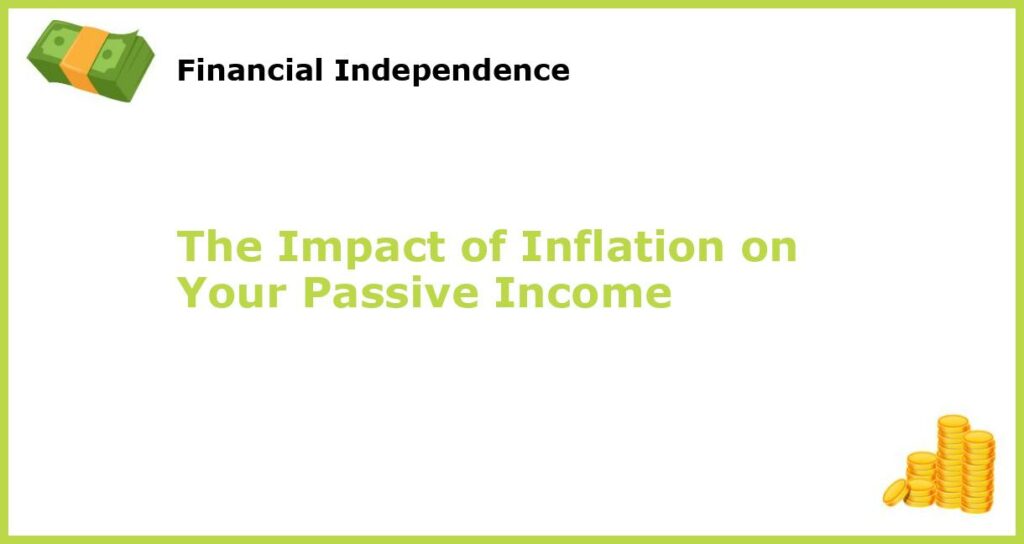Passive income is one of the most effective tools in ensuring long-term financial stability for investors. It refers to income earned with minimum effort, such as from investments, real estate, or any other source that does not require active participation. One of the most critical factors affecting passive income is inflation, which can lead to a decrease in the purchasing power of an investor’s income. Thus, it becomes essential for investors to have a plan for managing inflation’s impact on their passive income.
How Inflation Works Against Your Passive Income

Inflation is the rate at which the general price of goods and services increases over time, leading to an erosion in the value of money. For instance, if inflation is at 3%, the cost of living may go up by 3%, making it harder for an investor’s passive income to keep up with the soaring costs. Let us say you have a fixed deposit that earns an average annual return of 6%. If the inflation rate is also 3%, your investment will grow only by 3% after inflation. This way, you could be losing purchasing power instead of earning it through fixed deposits. Therefore, investors need to implement strategies to counter inflation’s impact on their passive income.
Why Investing in Real Estate Benefits Your Passive Income

Real estate investment is one of the most effective ways to counter inflation’s impact on passive income. Unlike other assets, real estate investment in a good location usually increases with time, which correlates positively with inflation. Additionally, landlords can adjust rental prices as the cost of living increases, ensuring that their passive income continues to grow. Real estate provides investors with the flexibility to sell their property during times of high inflation or market demand, thus increasing passive income by capital gains. Thus, by investing in the right property, investors can count on a reliable source of inflation-adjusted passive income over time.
The Role of Dividend Stocks in Passive Income and Inflation

Dividend stocks are a common strategy for mitigating the impact of inflation on an investor’s passive income. These types of stocks not only yield recurring income, but their income raises several times without the need to sell the assets. As the cost of living increases, many blue-chip companies increase their dividend payout, ensuring passive income continues to grow, making it an effective strategy against inflation. However, bond yields seldom keep pace with inflation, making equity investments and index funds more fitting for long-term investors. Therefore, investors can count on dividend stocks, index funds, and equity investments to protect their passive income against the ravages of inflation.
How TIPS Can Be Useful to Your Passive Income

Treasury Inflation-Protected Securities, TIPS, are government-provided bonds that act as a hedge against inflation. These bonds are a reliable way to ensure that an investor’s investment keeps pace with the cost of living. As inflation rises, the principal amount invested in TIPS adjusts, leading to an increase in passive income. Investors, especially those planning for retirement, can invest in TIPS, providing a reliable and steady source of income in their retirement years. Thus, TIPS can be an effective way to counter the impact of inflation on passive income.
The Cost of Delaying Your Inflation-Adjusted Planning

Many investors overlook the importance of planning for inflation-adjusted passive income, delaying or procrastinating the process. However, each year of delay means higher inflation rates and a larger impact on passive income earned. By delaying the inflation-adjusted planning process, investors may lose significant amounts on their earnings, especially when it comes to retirement planning. Therefore, investors must act promptly and plan for inflation-adjusted passive income as soon as possible to avoid any long-term negative impact on their earning potential.
The Role of the Government in Mitigating Inflation’s Effects

The government has no direct role in controlling inflation but can use policies and tools to mitigate inflation’s passive income impact on its citizens. Fiscal and monetary policies can aid in managing inflation expectations, controlling the money supply, and regulating interest rates, leading to the control of inflation’s primary effects. Hence, investors can benefit from a stable and inflation-controlled economy leading to a positive impact on their passive income’s value.
The Need to Monitor Inflation’s Impact on Passive Income

Monitoring inflation’s effect on passive income is critical for ensuring long-term financial stability. Active monitoring and factoring inflation into financial planning may prevent the devaluation of earning potential and future buying power. It is essential to understand the effects of inflation and its implications to make informed investment decisions thus preserving one’s passive income. Investors should keep monitoring the inflation rate and adopt effective investment strategies and planning to combat inflation’s impact.
The Role of Financial Advisors in Investing for Inflation-Adjusted Passive Income

Investing in inflation-adjusted passive income requires sophisticated knowledge and expertise, making it vital to consult with a financial advisor. Professional advisors can identify investment opportunities compatible with inflation, such as real estate, TIPS, dividend stocks, and blue-chip company investments. With trusted advice and effective investment strategies, investors can mitigate the adverse impact of inflation on their passive income. Hence, seeking professional advice can prove to be a beneficial decision for investors dealing with passive income.
The Takeaway

Investors seeking to have a reliable and long-term passive income source must plan and prepare for the impact of inflation on their investments. Inflation may trigger an erosion in the purchasing power of passive income over time. It’s essential to have strategic investments in assets that negate the impact of inflation, such as real estate, TIPS, dividend stocks, and blue-chip company investments, leading to a steady and reliable income flow.







